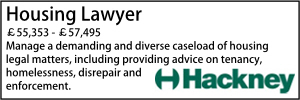Supreme Court refuses City of London permission to appeal in dispute with leaseholders over service charges
- Details
The Supreme Court has refused the City of London Corporation permission to appeal in a dispute with leaseholders of a tower block over whether certain repairs to their homes were chargeable to them, it has emerged.
A Supreme Court panel comprising Lord Kitchin, Lord Sales and Lord Stephens refused the Corporation permission to appeal “because the application does not raise an arguable point of law”.
The outcome of the decision was revealed in the Supreme Court’s list of permission decisions for May and June 2022, which was published last week.
In City of London v Various Leaseholders of Great Arthur House [2021] EWCA Civ 431 Lord Justice Lewison, with whom Lord Justice Arnold and Lord Justice Bean agreed, upheld a ruling by the Upper Tribunal Lands Chamber in favour of leaseholders of Great Arthur House.
This is a Grade 2 listed block of 120 flats, built in 1957. The flats are held under 125 years ‘right to buy’ leases and all contain a covenant requiring the lessee to pay the corporation a reasonable part of the costs of ‘specified repairs’ defined as those needed to keep in repair the structure and exterior of the premises but not amounting to the making good of structural defects.
The leases also include a clause concerning “any structural defect of whose existence the corporation has notified the tenant” of the estimated cost.
Great Arthur House is a concrete frame with the main east and west elevations largely clad in curtain wall glazing, contained by a framework of aluminium sections fixed to a timber sub-frame, in turn fixed to the edge of the floor slabs and ends of the cross walls of the main structure.
It has for many years suffered water penetration and the corporation concluded shortcomings in the original construction made remedial works unavoidable.
The judge said: “In a nutshell, the corporation's argument is that whether works are or are not works of repair is a question of fact and degree.
“Works do not cease to be works of repair merely because they simultaneously eradicate a defect in the building that has been there from the time it was constructed, where that defect has caused damage to or deterioration in the subject matter of the covenant.
“On the other hand, if works eradicate a defect which has resulted in neither damage to nor deterioration in the subject matter of the covenant, then those works are not works of repair. If works are repair, properly so called, then they fall within paragraph (i) of the definition, and are properly chargeable to the lessees.”
The tribunal found the leaseholders rather than the corporation were correct in their interpretation of what the leases meant concerning their liability to pay.
Lewison LJ said the question at the heart of the corporation’s appeal was the meaning of the phrase “not amounting to the making good of a structural defect”.
He said the interpretation the Upper Tribunal adopted was not contrary to the legislative purpose of the right to buy.
“It has long been the common law that…a seller (or lessor) gives no implied warranty that the dwelling has been properly constructed; or, indeed, that it is fit for habitation,” Lewison LJ said.
“But it is by no means surprising that Parliament gave a measure of consumer protection to persons to whom the ‘right to buy’ was given by partially insulating them from liability to contribute towards the cost of rectifying structural defects in the property in question.
“The case is all the stronger in the case of a building like Great Arthur House; because it cannot be supposed that the purchaser of single flat in a large block would commission a structural survey of the whole building before committing himself to acquiring a long lease.”
He said the lessees can be required to contribute to the cost of making good structural defects of which they were made aware before taking up the lease and those of which the landlord only became aware 10 years or more after the grant of the lease.
“That achieves a fair balance between the interests of landlord and tenant,” the Court of Appeal judge concluded.
Original reporting by Mark Smulian
Must read
Fix it fast: How “Awaab’s Law” is forcing action in social housing
Housing management in practice: six challenges shaping the sector
Why AI must power the next wave of Social Housing delivery
Sponsored articles
Unlocking legal talent
Walker Morris supports Tower Hamlets Council in first known Remediation Contribution Order application issued by local authority
09-12-2025 1:00 pm
11-12-2025 11:00 am







































